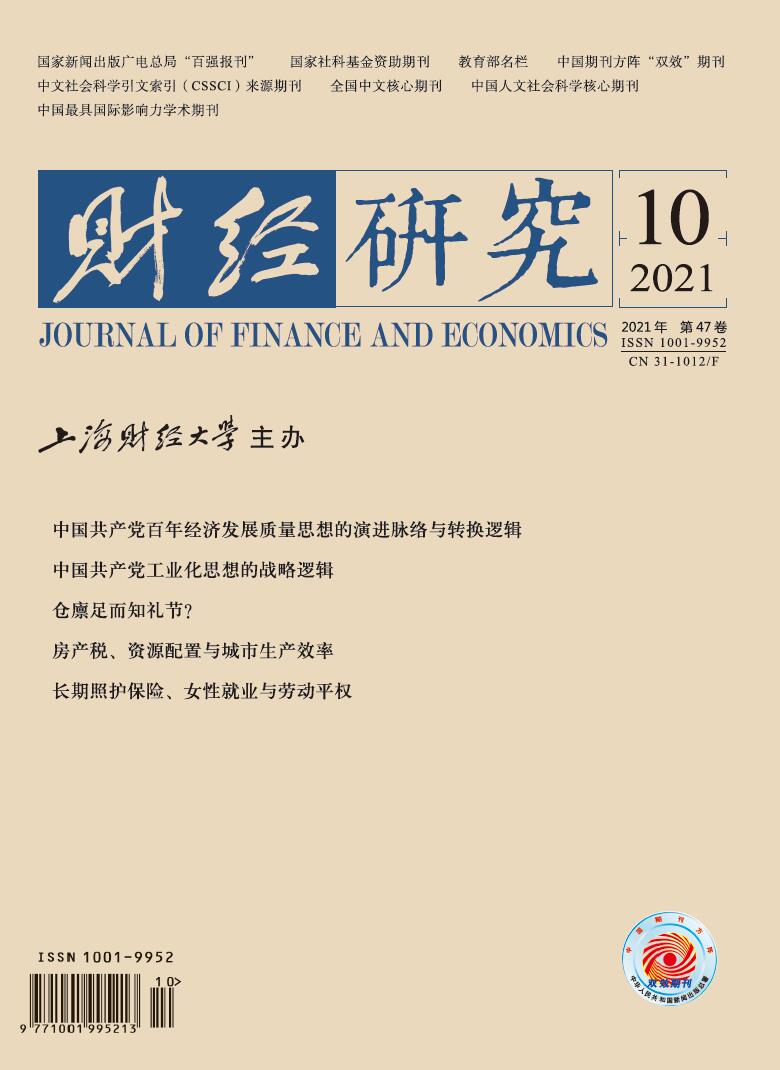诚实作为一种美德影响社会经济发展的诸多方面,然而关于公民诚实水平决定因素的研究却相对匮乏。早在两千年前,管仲便提出“仓廪实则知礼节”的假说,认为经济发展是公民诚实的重要影响因素之一,但是由于数据限制和识别困难一直以来较难通过实证来检验。文章借助多国行为数据和多种工具变量,检验了经济发展、制度质量和文化因素对公民诚实的因果效应。研究结果表明:首先,相对于制度因素和文化因素,经济因素对诚实水平的影响更为显著;其次,经济发展对诚实水平的影响有滞后性,其当期影响并不显著;第三,以上结果在不同模型设定、不同估计方法和不同控制变量下是稳健的。此外,文章还进一步讨论了几种可能的影响机制。结果证实了管仲的论断,并且具有重要的政策含义和参考价值:第一,促进经济发展的政策同样有利于推动公民道德建设;第二,促进个人自愿遵从的干预政策可以起到重要的作用;最后,制定相关政策应当考虑具体的社会经济背景。
仓廪足而知礼节?——经济发展与公民诚实
摘要
参考文献
4 Allingham M G,Sandmo A. Income tax evasion:A theoretical analysis[J]. Journal of Public Economics,1972,1(3-4): 323−338. DOI:10.1016/0047-2727(72)90010-2
5 Ashraf Q,Galor O. The‘Out of Africa’hypothesis,human genetic diversity,and comparative economic development[J]. American Economic Review,2013,103(1): 1−46. DOI:10.1257/aer.103.1.1
6 Croson R,Buchan N. Gender and culture:International experimental evidence from trust games[J]. American Economic Review,1999,89(2): 386−391. DOI:10.1257/aer.89.2.386
7 Dufwenberg M,Dufwenberg M A. Lies in disguise: A theoretical analysis of cheating[J]. Journal of Economic Theory,2018,175: 248−264. DOI:10.1016/j.jet.2018.01.013
8 Enke B, Rodríguez-Padilla R, Zimmermann F. Moral universalism and the structure of ideology[R]. Working Paper No. 27511, 2020.
10 Falk A,Becker A,Dohmen T,et al. Global evidence on economic preferences[J]. The Quarterly Journal of Economics,2018,133(4): 1645−1692. DOI:10.1093/qje/qjy013
11 Fischbacher U,Föllmi-Heusi F. Lies in disguise: An experimental study on cheating[J]. Journal of the European Economic Association,2013,11(3): 525−547. DOI:10.1111/jeea.12014
12 Franzen A,Pointner S. The external validity of giving in the dictator game:A field experiment using the misdirected letter technique[J]. Experimental Economics,2013,16(2): 155−169. DOI:10.1007/s10683-012-9337-5
13 Gächter S,Schulz J F. Intrinsic honesty and the prevalence of rule violations across societies[J]. Nature,2016,531(7595): 496−499. DOI:10.1038/nature17160
14 Galor O,Özak Ö. The agricultural origins of time preference[J]. American Economic Review,2016,106(10): 3064−3103. DOI:10.1257/aer.20150020
15 Gennaioli N, La Porta R, Lopez-de-Silanes F, et al. Trust and insurance contracts[R]. Working Paper No. 27189, 2020.
16 Gorodnichenko Y,Roland G. Culture,institutions,and the wealth of nations[J]. The Review of Economics and Statistics,2017,99(3): 402−416. DOI:10.1162/REST_a_00599
17 Guiso L,Sapienza P,Zingales L. Does culture affect economic outcomes?[J]. Journal of Economic Perspectives,2006,20(2): 23−48. DOI:10.1257/jep.20.2.23
18 Haidt J. The emotional dog and its rational tail:A social intuitionist approach to moral judgment[J]. Psychological Review,2001,108(4): 814−834. DOI:10.1037/0033-295X.108.4.814
19 Hall R E,Jones C I. Why do some countries produce so much more output per worker than others?[J]. The Quarterly Journal of Economics,1999,114(1): 83−116. DOI:10.1162/003355399555954
20 Hofstede G H. Culture’s consequences: Comparing values, behaviors, institutions and organizations across nations[M]. Beverly Hills, CA: Sage Publications, Inc., 2001.
21 Howells T H. Factors influencing honesty[J]. The Journal of Social Psychology,1938,9(1): 97−102. DOI:10.1080/00224545.1938.9921677
22 Inglehart R. The silent revolution in Europe:Intergenerational change in post-industrial societies[J]. The American Political Science Review,1971,65(4): 991−1017. DOI:10.2307/1953494
23 Inglehart R, Welzel C. Modernization, cultural change, and democracy: The human development sequence[M]. Cambridge: Cambridge University Press, 2005.
24 Kosse F,Deckers T,Pinger P,et al. The formation of prosociality:Causal evidence on the role of social environment[J]. Journal of Political Economy,2020,128(2): 434−467. DOI:10.1086/704386
25 Kuznets S. Economic growth and income inequality[J]. American Economic Review,1955,45(1): 1−28.
26 Luttmer E F P,Singhal M. Tax morale[J]. Journal of Economic Perspectives,2014,28(4): 149−168. DOI:10.1257/jep.28.4.149
27 Michalopoulos S. The origins of ethnolinguistic diversity[J]. American Economic Review,2012,102(4): 1508−1539. DOI:10.1257/aer.102.4.1508
28 Pitchik C,Schotter A. Honesty in a model of strategic information transmission[J]. American Economic Review,1987,77(5): 1032−1036.
29 Pruckner G J,Sausgruber R. Honesty on the streets:A field study on newspaper purchasing[J]. Journal of the European Economic Association,2013,11(3): 661−679. DOI:10.1111/jeea.12016
30 Rosenbaum S M,Billinger S,Stieglitz N. Let’s be honest:A review of experimental evidence of honesty and truth-telling[J]. Journal of Economic Psychology,2014,45: 181−196. DOI:10.1016/j.joep.2014.10.002
31 Schneider F, Enste D H. The shadow economy: An international survey[M]. Cambridge: Cambridge University Press, 2013.
32 Shalvi S,Eldar O,Bereby-Meyer Y. Honesty requires time(and lack of justifications)[J]. Psychological Science,2012,23(10): 1264−1270. DOI:10.1177/0956797612443835
33 Somanathan E,Rubin P H. The evolution of honesty[J]. Journal of Economic Behavior & Organization,2004,54(1): 1−17.
34 Spolaore E,Wacziarg R. Ancestry and development:New evidence[J]. Journal of Applied Econometrics,2018,33(5): 748−762. DOI:10.1002/jae.2633
35 Spolaore E,Wacziarg R. The diffusion of development[J]. The Quarterly Journal of Economics,2009,124(2): 469−529. DOI:10.1162/qjec.2009.124.2.469
36 Tabellini G. Institutions and culture[J]. Journal of the European Economic Association,2008,6(2-3): 255−294. DOI:10.1162/JEEA.2008.6.2-3.255
37 Tang L. Five ways China must cultivate research integrity[J]. Nature,2019,575(7784): 589−591. DOI:10.1038/d41586-019-03613-1
引用本文
黄维盛, 丛树海. 仓廪足而知礼节?——经济发展与公民诚实[J]. 财经研究, 2021, 47(10): 35-49.
导出参考文献,格式为:
上一篇:企业参与精准扶贫与缓解融资约束
下一篇:空气质量与企业员工流失






 4086
4086  3572
3572

